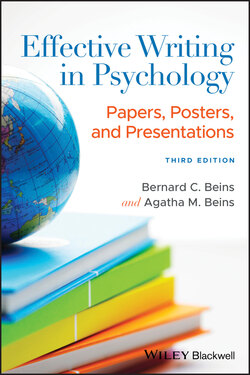Читать книгу Effective Writing in Psychology - Bernard C. Beins - Страница 30
Ethical Writing
ОглавлениеAcademic integrity is a concept that guides ethical writing and more broadly addresses cheating, plagiarism, and even denying others access to scholarly resources. In this section we offer examples and tips to help you avoid plagiarism but suggest you read your university's policy on academic integrity because, whether intentional or unintentional, plagiarism is a very serious infraction. By plagiarism, we mean the use or representation of someone else's idea or language as your own, which can include:
summarizing someone else's idea without giving that person credit;
using someone else's language without giving that person credit;
using someone else's language without quotation marks, even if you give that person credit for the idea;
taking work that someone else wrote (whether published or not) and presenting it as your own.
Scholars do not consider it plagiarism if you present information that is common knowledge without a citation. That is, if you offer information that you expect an average person would know, such as the temperature at which water freezes or who the fifth United States president is, then you can include that information without needing to cite any sources. However, the margins of common knowledge are not always clear. For example, if your audience is other psychologists, what is considered common knowledge might be different than if your audience is a group of sociologists. Whereas psychologists tend to know that John Watson was central in explaining human behavior through conditioning, sociologists might be less familiar with that knowledge, so it would make sense to include a specific reference to Watson's work if your readers are not psychologists.
Here we hope to offer resources and practices to eliminate the chance that you might unintentionally plagiarize, and we hope this book provides you with resources and tools so that you do not even consider plagiarizing intentionally. You might forget to cite a source when you are writing your paper, or you might have taken notes but forgotten to write down which source those notes are from. Regardless of your intentions, the first example is plagiarism and the second could become plagiarism. Consequently, academic integrity starts when you are in the preliminary research phase and continues through the research and writing process.
To clarify what is considered plagiarism, we offer an excerpt from a scholarly source and a paragraph that attempts to paraphrase the scholarly source (this example is inspired by a University of Kent's psychology department web page at www.kent.ac.uk/ai/students/whatisplagiarism.html). In Figure 2.1 we outline the mistakes in the paraphrased version and then offer a way to rewrite it, which is described in Figure 2.2.
Figure 2.1 Examples of plagiarism.
Figure 2.2 Revision that avoids plagiarism.
